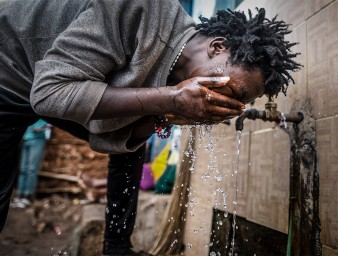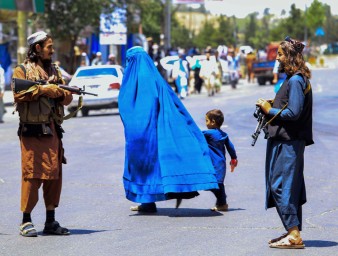Empowering women and girls through sport
29 May 2012

“I box because I want to advance myself and advance Afghanistan,” said 17-year-old Sadaf Rahimi in The Boxing Girls of Kabul, a 2011 documentary.
Sadaf will be Afghanistan’s first female boxer to participate in the Olympic Games, scheduled in London, United Kingdom, in the summer of 2012 and only the third Afghan sportswoman to compete at the Olympic Games.
In Afghanistan, women were allowed to participate in sport after the fall of the Taliban regime in 2001. However, Sadaf continues to receive threats because “many people think that girls should stay home,” she said to The Guardian, a British newspaper.
Discrimination against women and girls in sport and physical education is widespread in several countries around the world.
In Saudi Arabia, for example, women and girls are barred from participating in sport and physical education. Saudi Arabia is one of only three countries never to have sent a female athlete to the Olympics. The other two, Qatar and Brunei, do not bar women from competitive sports, and both governments have said that they would send women athletes to this summer’s Olympic Games.
In many other countries around the world, the number of women and girls engaging in sport is falling. In the United Kingdom, for example, the gap between the amount of exercise girls and boys do widens during their time at school as many girls opt out of physical education due to lack of confidence in their sporting skills or, as some girls indicated in a research conducted by Loughborough University, due to a lack of female sporting role models.
The participation of women and girls in sport challenges a multitude of gender stereotypes and discrimination. Stereotypical attitudes can also fuel inequality in wages, prizes, and other financial incentives. In general, in the area of commercial endorsements and sponsorships, women receive far less support than their male counterparts. In 2007, for the first time, the Wimbledon tennis tournament offered equal prize money for the men’s and women’s singles winner.
The social benefits of participation in sport are thought to be especially important for girls, given that many girls, particularly in adolescence, have fewer opportunities than boys for social interaction outside the home and beyond family structures, according to a UN study on women, gender equality and sport. In addition to generating physical and mental health benefits, sport can be an effective platform to provide women and girls withleadership skills they can transfer to other domains, such as civic engagement or professional life. Strength, perseverance, commitment, team spirit, solidarity, negotiation, and respect for others are values that are central to sport but also to the pursuit of gender equality and women’s empowerment.
“Both sport and human rights share many fundamental values and objectives,” said Pillay at a UN Human Rights Council panel discussion on sport and human rights organized earlier this year. “It is surprising to note how little interaction there has been so far between the human rights movement, mechanisms and institutions and the world of sport.”
According to UN Women, the UN entity for gender equality and the empowerment of women, there has been progress in recent years, notably through the International Olympic Committee in introducing quotas for women’s representation in sports organizations. Yet, stereotypes about what it means to be a man or a woman continue to play an important role in determining access and levels of participation, both in the stadium and in the structures of the broader sports movement.
The recent decision by FIFA, football’s international governing body, to overturn a ban, introduced in 2007, on the use of a headscarf, or hijab, is also a step forward in increasing the participation of women and girls in sport. Because of the ban, the Iranian women’s soccer team was not able to play its 2012 Olympic second round qualifying match because the players refused to remove their hijabs. “Such a harmonization would remove a barrier that can deter women and girls from participating in football and would send a positive example,” said Wilfried Lemke, the UN Secretary-General’s Special Adviser on Sport for Development and Peace.
The right of access to and participation in sport and play has been recognized in a number of international instruments, including the Universal Declaration of Human Rights (articles 24 and 27), the International Covenant on Social, Economic and Cultural Rights (article 15), the Convention on the Rights of the Child (article 31), the Convention on the Elimination of all Forms of Discrimination against Women (articles 10 and 13) and the Convention on the Rights of People with Disabilities (article 30).Under international human rights law, States are also obliged to take all appropriate measures to eliminate gender stereotypes (article 5 of the Committee on the Elimination of all Forms of Discrimination against Women), including in the area of sport.
29 May 2012

VIEW THIS PAGE IN:



